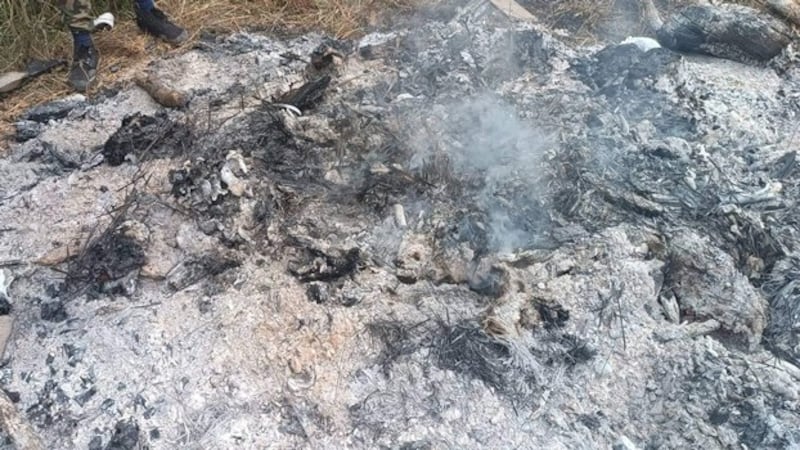More than 440 bodies, mostly those of civilians, were burned by ruling junta forces across Myanmar between March 2022 and September 2023, according to a report by a U.K.-based nonprofit group dedicated to exposing human rights abuses and war crimes.
The report from the Centre for Information Resilience, or CIR, said the military regime's soldiers have routinely set villages ablaze and torched civilians – including some believed to be burned alive – amid the ongoing conflict with anti-junta forces to spread fear and control the population.
The report, issued on Dec. 24, the second anniversary of a Christmas Eve massacre in Kayah state, was based on information from local media reports and user-generated content compiled by the Myanmar Witness project which has monitored and documented human rights violations in Myanmar since the coup.
At that massacre two years ago, Myanmar army soldiers killed at least 35 civilians, including women and children, and burned their bodies near a village called Moso, Radio Free Asia reported. The number was later increased to 50 civilians.
Despite clear evidence and witness accounts pointing to national troops as the perpetrators, Myanmar’s military junta, which seized power from an elected government in a February 2021 coup, denied responsibility for the killings and blamed local resistance forces.
Matt Lawrence, director of the Myanmar Witness project, called the incidents “another horrific dimension to the impact of the conflict on the people of Myanmar.”
Grisly images
Investigators relied on local media reports and user-generated content to determine how many civilians were burned during the 19-month period, using photos and videos from social media platforms.
In one instance, the photos and videos allowed investigators to identify the burned bodies of 150 victims, including what appeared to be the charred bodies of children, and corpses of others stacked before being set ablaze, the report said.
“Who these individuals were, and how they ended up here, is far less clear, but open source evidence suggests that some were burnt alive, while others were burnt after death or as a result of an artillery or air strike.” CRI said.

Most of the burnings occurred in northwestern Myanmar’s Sagaing region, a hotbed of armed resistance to the junta, but the report did not specify whether civilians there were burned after being killed or burned to death before they died.
A local resident said that when the junta troops raided the villages and set fire to their homes during the clearance operations, some elderly people who could not escape were also burned to death.
During a raid of Mu Gyi in Sagaing region on Nov. 24, 2022, about 100 Myanmar soldiers burned down nearly 200 houses killing about six people, said a resident, who did not want to be named for security reasons. Among them was 80-year-old Aye Yin, who died because she could not escape.
“The junta troops raided the village and torched houses owned by people who had connections to members of People’s Defense Forces,” said the resident, referring to local armed resistance fighters. “The fire spread and burned down other houses.”
Seeking justice
The greatest number of civilians burned in a single incident occurred during the December 2021 attack in Kayah state's Moso village.
Zue Padonmar, one of the secretaries of the Karenni State Interim Executive Council, said local officials tried to take action against the military, which had committed the mass killings but still enjoyed impunity.
“We talked to international organizations to find ways to punish this army, especially for committing these war crimes [and] genocide, and in order to not support the mechanisms of the military council. We also continuously recorded accounts about the perpetrators.”
Those who burned civilians to death or burned dead bodies should receive capital punishment, some Burmese legal experts said.
Because the acts are war crimes, top military leaders and commanders should be prosecuted by the International Criminal Court, said Kyee Myint, a veteran high court lawyer.
“The people who gave the orders will be sent to jail, [and] the rest will be tried under domestic law,” he told RFA. “Burning people alive is an international crime.”
RFA’s calls to junta spokesman Maj. Gen. Zaw Min Tun for comment went unanswered on Tuesday.
Translated by Htin Aung Kyaw for RFA Burmese. Edited by Roseanne Gerin and Malcolm Foster.
